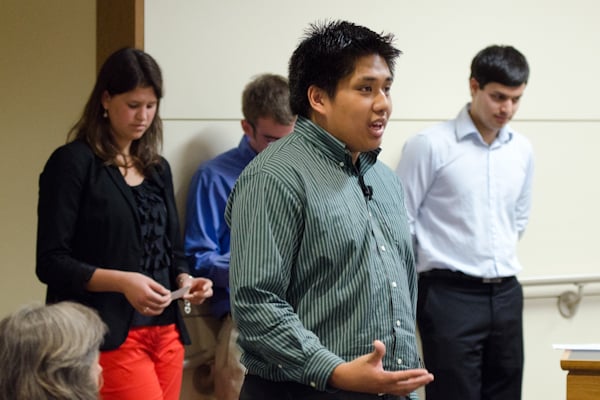Student presentations by ASSU representatives led the agenda at the Faculty Senate’s Feb. 9 meeting. The session also included a report by Dean of Earth Sciences Pamela Matson.
President John Hennessy opened the meeting by noting the conclusion of the Stanford Challenge, a five-year fundraising initiative that raised $6.2 billion in pledges for the University. The Challenge fundraising will support areas including new faculty positions, need-based financial aid and facility construction.
ASSU President Michael Cruz ‘12 opened the segment devoted to student presentations by discussing the significance of diversity at Stanford, noting that — among the vast range of issues facing students — the composition of the University affects the entire campus community.

Emphasizing steps already taken, such as the development of the Native American Community Center (NACC) and the subsequent spike in retention among Native American students, Cruz credited the University with embracing diversity, but highlighted the importance of continued progress.
“This diversity ultimately gives students more ways to connect with their faculty and their administrators,” Cruz said.
Reagan Thompson ‘12, ASSU representative-at-large, focused on expanding the extent and type of faculty-student interaction — in particular, examining office hours and advising structures.
Noting that students often find faculty daunting, Thompson argued for “office hours where students can talk not just about the class but also their Stanford career” and for faculty to become more proactive in encouraging student engagement.
Thompson also said a lack of outreach by academic advisers can marginalize their utility to students, especially in important areas such as recommendations and honors theses.
Noting that the recent Study of Undergraduate Education (SUES) report highlighted the falling number of honors students as an area of concern, Thompson suggested that increased access to faculty advising may reverse the trend.
Daniel DeLong ‘13, ASSU undergraduate representative to the Faculty Senate, emphasized the flawed nature of Stanford’s current course evaluation system, citing stress imposed on faculty — coupled with a lack of awareness among students of the purpose and application of evaluations — and a lack of transparency surrounding how evaluations impact the future of courses.
“We have an imperfect evaluation process, [and] one that really affects untenured faculty,” DeLong said. “It makes them be safe rather than challenging students.”
Kamil Dada ‘11, ASSU graduate representative and former Daily editor in chief, highlighted four issues needing review. Dada noted that co-terminal students, trapped between undergraduate and graduate student bodies, often fail to integrate into the University community. He highlighted a lack of awareness among graduate students about the Honor Code at Stanford and its implications for academic work.
Dada also cited the lack of counseling available to PhD and post-doctoral students at the Career Development Center and the yearlong nature of Cardinal Care health insurance — regardless of leaves of absence — as other pressing concerns.
Faculty members largely concurred with the ASSU representatives’ reports, with discussion focusing on the interaction between graduate and undergraduate students and the merits of course evaluations.
Both Cruz and Dada said the ASSU can and should play a role in increasing interaction between undergraduate and graduate students, noting that the ASSU already includes leadership from both communities.
“The barrier between undergraduate and graduate students is co-created,” Cruz said. “The ASSU is trying to bridge that gap by bringing them into the same location.”
Caroline Hoxby, a professor in economics, cited the move to online evaluations as promoting polarized student viewpoints, noting that students who are apathetic toward a class are less likely to evaluate it. Hoxby advocated in class course evaluations.
“I think that it has degraded the overall evaluation process,” she concluded, “and students don’t take them seriously.”
Matson followed the student reports with a presentation on the School of Earth Sciences. Noting the Earth Sciences’ role in addressing pressing global challenges, Matson argued for the field’s sustained prominence at Stanford and cited the school’s ability to adapt to new challenges.
While acknowledging that encouraging more minority applicants has proven a challenge, Matson highlighted the growth in applications to the graduate program — up 64 percent from 2005-06 — as among the highest in the University.
The number of undergraduate majors within the school has grown similarly — by 41 percent — since 2005-06. Matson said that the school has gradually created an intellectual community with resources available to the broader University.
The Faculty Senate’s next meeting is scheduled for Feb. 23, when the Committee on Undergraduate Standards and Policies (C-USP) will bring the SUES report’s recommendations before the Senate. The March 8 session is also reserved for discussion of the report.